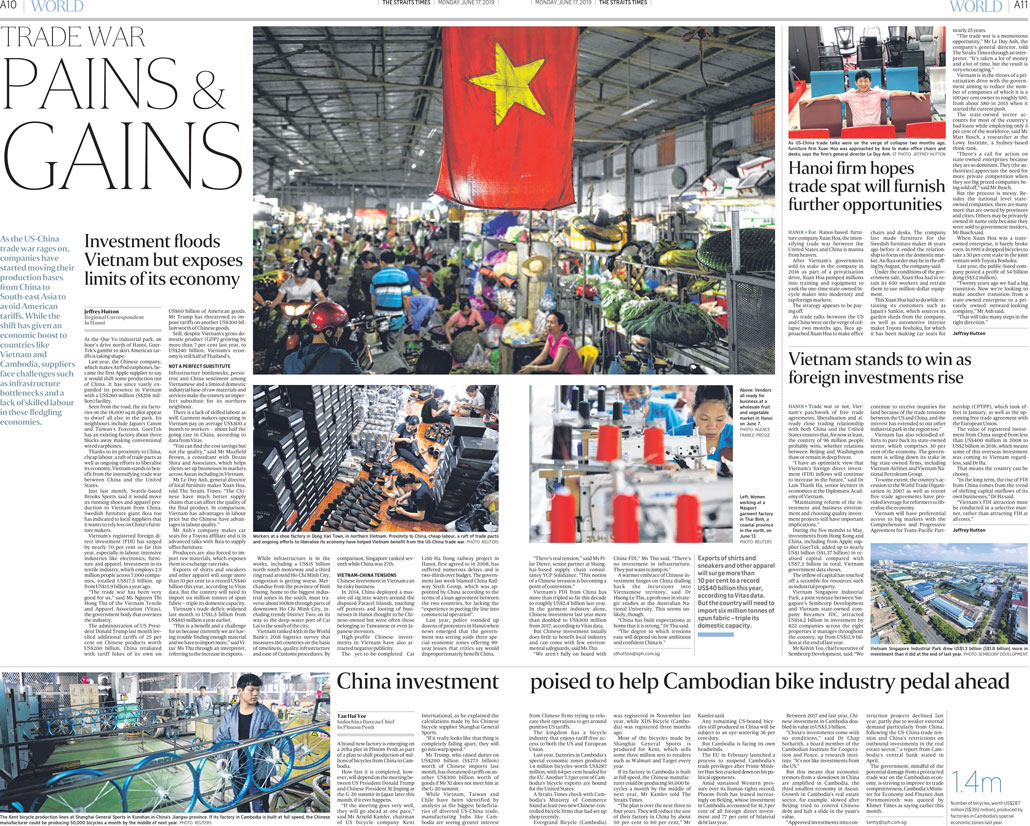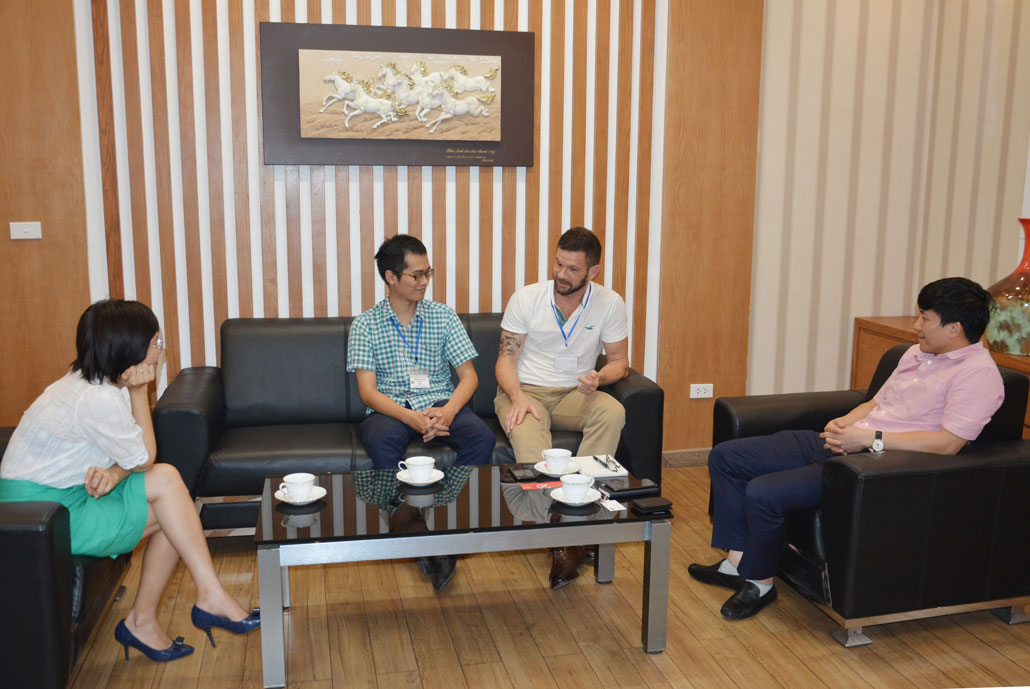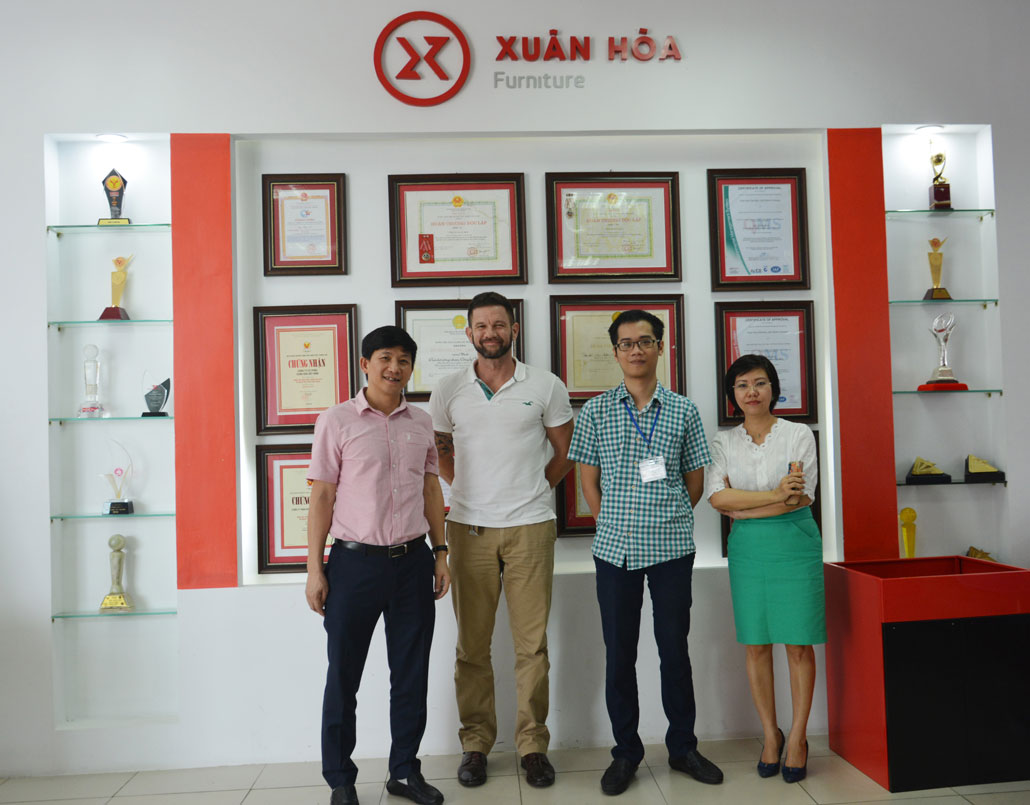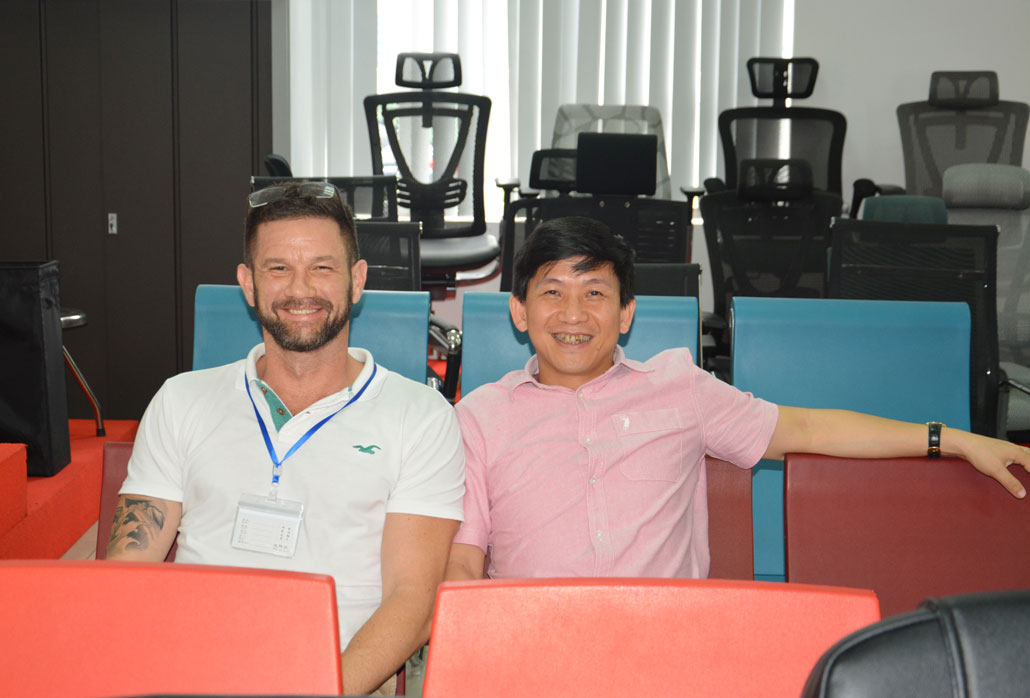Báo The Straits Times- Singapore viết bài về Xuân Hòa

Bài viết đăng trên báo The Straits Times có tiêu đề: “Hanoi firm hopes trade spat will furnish further opportunities”
Xuân Hòa xin trích đăng lại nội dung bài báo và bản dịch sơ lược để Quý Khách hàng và độc giả cùng theo dõi:
Hanoi firm hopes trade spat will furnish further opportunities
For Hanoi-based furniture company Xuan Hoa, the intensifying trade war between the United States and China is manna from heaven.
After Vietnam’s government sold its stake in the company in 2016 as part of a privatisation drive, Xuan Hoa pumped millions into training and equipment to yank the one-time state-owned bicycle maker into modernity and tap foreign markets.
The strategy appears to be paying off. As trade talks between the US and China were on the verge of collapse two months ago, Ikea approached Xuan Hoa to make officechairs and desks. The company last made furniture for the Swedish furniture maker 16 years ago before it ended the relationship to focus on the domestic market.
An Ikea order may be in the offing by August, the company said. Under the conditions of the government sale, Xuan Hoa had to retain its 650 workers and retrain them to use million-dollar equipment. This Xuan Hoa had to do while retaining its customers such as Japan’s Sankin, which sources its garden sheds from the company, as well as automotive interior maker Toyota Boshoku, for which it has been making car seats for nearly 25 years.
“The trade war is a momentous opportunity,” Mr Le Duy Anh, the company’s general director, told The Straits Times through an interpreter. “It’s taken a lot of money and a lot of time, but the result is very encouraging.”
Vietnam is in the throes of a privatisation drive with the government aiming to reduce the number of companies of which it is a 100 per cent owner to roughly 100, from about 580 in 2015 when it started the current push.
The state-owned sector accounts for most of the country’s bad loans while employing only 5 per cent of the workforce, said Mr Matt Busch, a researcher at the Lowy Institute, a Sydney-based think-tank.
“There’s a call for action on state-owned enterprises because they are so dominant. They (the authorities) appreciate the need for more private competition when they see big prized companies being sold off,” said Mr Busch.
But the process is messy. Besides the national level stateowned companies, there are many more that are owned by provinces and cities. Others may be privately owned in name only because they were sold to government insiders, Mr Busch said.
When Xuan Hoa was a stateowned enterprise, it barely broke even. In 1995 it dropped bicycles to take a 30 per cent stake in the joint venture with Toyota Boshoku.
Last year, the public-listed company posted a profit of 54 billion dong (S$3.2 million). “Twenty years ago we had a big transition. Now we’re looking to make another transition from a state-owned enterprise to a privately owned outward-looking company,” Mr Anh said. “That will take many steps in the right direction.”
Jeffrey Hutton
Bản dịch: Xung đột thương mại Mỹ Trung và các cơ hội trong kinh doanh
Đối với Xuân Hòa- đơn vị sản xuất và kinh doanh nội thất hàng đầu tại Việt Nam, xung đột thương mại giữa Mỹ và Trung Quốc cũng mang lại cơ hội trong kinh doanh.
Sau khi tiến hành cổ phần hóa doanh nghiệp năm 2016, Xuân Hòa đã đầu tư hàng triệu đô la vào hệ thống trang thiết bị sản xuất để đưa các sản phẩm nội thất của mình vươn ra thị trường quốc tế.
Chiến lược đúng đắn này dường như đang được đền đáp. Ông lớn trong ngành nội thất Thụy Điển Ikea đã tiếp cận với Xuân Hòa để đặt hàng các loại bàn ghế văn phòng trong bối cảnh các cuộc đàm phán thương mại giữa Mỹ và Trung Quốc đang trên bờ vực sụp đổ hai tháng trước.
Sau khi cổ phần hóa, Xuân Hòa đã đầu tư vào nguồn nhân lực, đào tạo, nâng cao trình độ của công nhân để có thể sử dụng thành thạo các máy móc, thiết bị hiện đại trị giá hàng triệu đô. Xuân Hòa phải làm điều này để giữ chân các khách hàng quốc tế lớn của mình như: Sankin, Nhật Bản hay nhà sản xuất nội thất ô tô Toyota Boshoku, công ty đã sản xuất ghế ô tô trong suốt 25 năm cho tập đoàn Toyota.
“Xung đột thương mại Mỹ Trung cũng mang đến một số cơ hội đầu tư mới trong kinh doanh” – Ông Lê Duy Anh, Tổng giám đốc Công ty Cổ phần Xuân Hòa Việt Nam trả lời phỏng vấn tờ The Straits Times.
Việt Nam đang trong giai đoạn thúc đẩy cổ phần hóa các doanh nghiệp nhà nước nhằm giảm số lượng công ty do nhà nước nắm giữ cổ phần. Matt Busch, một nhà nghiên cứu tại Viện Lowy có trụ sở tại Sydney, cho biết, khu vực kinh tế thuộc sở hữu nhà nước chiếm phần lớn các khoản nợ xấu của quốc gia trong khi chỉ sử dụng 5% lực lượng lao động.
Khi còn là một doanh nghiệp nhà nước, Xuân Hòa hầu như chỉ hòa vốn. Năm 1995, Xuân Hòa đã mua 30% cổ phần trong liên doanh với Công ty Toyota Boshoku- chuyển sản xuất ghế ngồi trong xe ô tô của tập đoàn Toyota Nhật Bản. Đến năm ngoái, Xuân Hòa đã công khai báo lãi 54 tỷ đồng (tương đương 3,2 triệu đô la Singapore).
“ Xuân Hòa đã có một sự thay đổi lớn khi chuyển từ một doanh nghiệp nhà nước sang một công ty tư nhân. Hiện tại, chúng tôi vẫn đang tiếp tục hoàn thiện, phát triển và chuyển đổi mạnh mẽ hơn nữa để vươn ra thị trường quốc tế, ông Lê Duy Anh nói.
Một số hình ảnh nhà báo Jeffrey Hutton phỏng vấn Tổng giám đốc Lê Duy Anh:

Nhà báo Jeffrey Hutton đặt các câu hỏi về chiến tranh thương mại Mỹ- Trung…

…trao đổi cởi mở để tìm hiểu về Xuân Hòa

…Làm việc trong showroom để tìm hiểu cụ thể về sản phẩm

Nhà báo Jeffrey Hutton chụp ảnh lưu niệm cùng Tổng giám đốc Lê Duy Anh